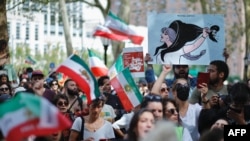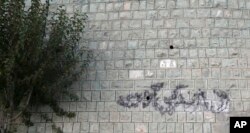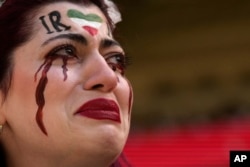Last week, the United States, Australia, Canada and the United Kingdom introduced a new round of sanctions against Iran over its human rights abuses.
The announcement was timed to commemorate Mahsa Amini, the 22-year-old Iranian woman who died on September 16, 2022, three days after Iran’s Guidance Patrol (morality police) took her into custody for allegedly violating the country’s hijab regulations.
Witnesses claim she was beaten en route to a detention center. Her death sparked the country’s biggest protest in decades.
On September 13, the one-year anniversary of Amini’s detention, Australia introduced sanctions and travel bans “on four individuals and three entities responsible for the oppression of people in Iran, including women and girls.”
Those sanctions targeted Iran's Cyber Police, which Australia said, “is central to obstructing freedom of expression through restricting internet activity in Iran,” and Iran’s state-owned English language broadcaster Press TV.
On September 13, Press TV called the sanctions an act of censorship:
“In yet another attack spearheaded by the West against freedom of speech in Iran, the Australian government has imposed a fresh round of sanctions on a number of Iranian individuals and entities, including the English-language Press TV news network, on the anniversary of foreign-backed riots in the country.”
That is false.
Press TV is not about freedom of speech in Iran but promoting Iran’s foreign policy objectives abroad.
The Islamic Republic has created one of the worst press freedom environments globally, with authorities further cracking down on media freedoms and public assembly in the wake of Amini’s death. Iran’s efforts to portray the Mahsa Amini protests as a foreign-backed “color revolution” are meant to paper over wide dissatisfaction with decades of authoritarian rule and mismanagement.
Australia, like the United Kingdom and European Union, sanctioned Press TV for producing and broadcasting forced confessions of detainees.
Ervand Abrahamian, a leading historian of modern Iran, argued that the ability to broadcast forced confessions “armed the Islamic Republic with a propaganda weapon unimagined by the likes of Stalin, Mao, and the Shah.”
Iranian law permits only the state to own and operate television and radio stations.
Two years before the Mahsa Amini protests, the International Federation for Human Rights and Justice for Iran reported that Iranian state-owned media had broadcast at least 355 forced confessions between 2009 and 2019.
The report said that Iran, China, North Korea and Vietnam are the only countries that “systematically broadcast videos of such confessions.”
Forced confessions are not admissible in court and are illegal, under both Iranian and international law.
Iran has attempted to circumvent its own law in part by sentencing individuals to a “specific number of lashings on the ground that they had lied,” Abrahamian wrote in The New York Times in February 2018.
But the abuse goes much further.
Victims have described their torturers using lighters, cutters, cattle prods and cables, as well as forcibly injecting them with hallucinatory drugs and subjecting them to years in solitary confinement, to elicit confessions.
Forced confessions have continued since Amini’s death.
In December 2022, Iranian state media broadcast the confessions of five individuals accused of a failed plot to detonate a bomb in the southern Iranian city of Shiraz.
Friends and relatives of those individuals said they confessed after being tortured by Iranian authorities. Rights groups say such confessions can provide the pretext for harsh penalties, including capital punishment, for those protesting Amini’s death.
In May, Majid Kazemi, Saleh Mirhashemi and Saeed Yaghoub were sentenced to death after sham trials, for what Amnesty International called the “vaguely worded and overly broad charge of ‘enmity against God.’”
Amnesty said those unfounded allegations were based on the defendants’ “torture-tainted ‘confessions'” that they had used firearms during a protest in Isfahan, where three members of the security forces died.
However, the men were not charged or convicted of murder.
Following Amini’s death, Reporters Without Borders (RSF) said “Iran has reinforced its position as one of the world’s most repressive countries in terms of press freedom.”
Iran is at the bottom of RSF’s press freedom list — 177 out of 180.
Freedom House, a Washington-based human rights group, said Iranian authorities have tried to silence those reporting on the protests and severely restricted internet access, “including curbs on access to the social media platforms Instagram and WhatsApp.”
RSF said Iran has arrested 79 journalists, many of them women, in connection with those protests.
Iran has also ramped up public surveillance to identify and penalize the growing number of women who are flouting the Islamic Republic’s dress code.
Efforts to suppress popular discontent also turned deadly.
In January, activists said more than 500 people had been killed and 20,000 arrested over four months of protest.
Human Rights Watch said it had compiled reports from family members of at least 36 people “who were killed or executed following unfair trials” connected with the protests. Over the past month, those family members found themselves subject to arrest, prosecution and/or imprisonment.
Human Rights Watch, citing an August 14 BBC report, said authorities have pressured the families of those killed not to hold memorial services.
On September 14, the United Nations Human Rights Council’s independent international fact-finding mission on the Islamic Republic of Iran accused Iranian authorities of “exacerbating punitive measures against those exercising their fundamental rights, including freedom of religion, freedom of expression and peaceful assembly” in the nearly one year following Amini’s death.
“One year ago, Mahsa’s tragic and senseless death in the custody of Iran’s so-called ‘Morality Police’ sparked demonstrations across Iran that were met with unspeakable violence, mass arrests, systemic internet disruptions and censorship by the Iranian regime,” U.S. Secretary of State Antony Blinken said on September 15.
“We will continue to take appropriate action, alongside our international partners, to hold accountable those who suppress Iranians' exercise of human rights.”







